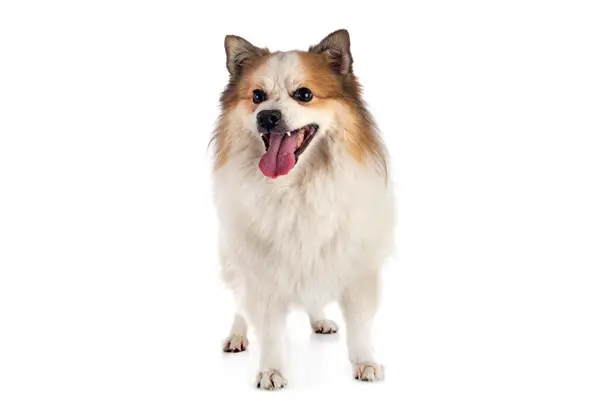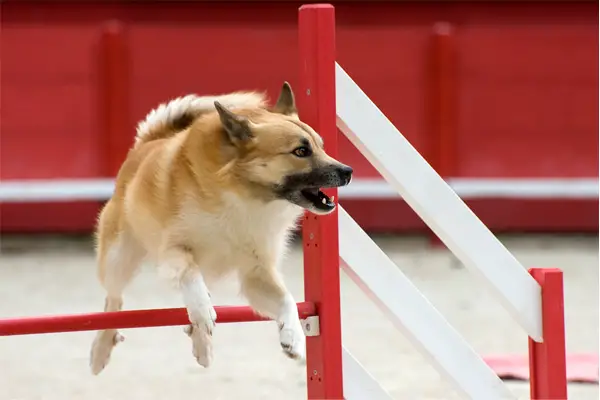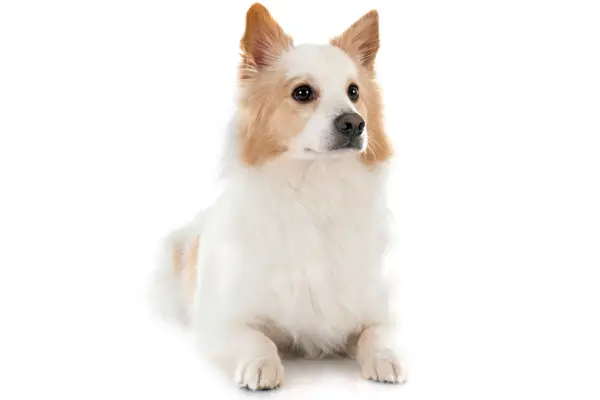Icelandic Sheepdogs are medium-sized dogs that stand at a height of 18 inches. Their bodies are covered with a thick, straight or wavy double coat that comes in shades of tan, chocolate brown, gray, and black. The Icelandic Sheepdog also features a fox-like face and pointy ears that emphasize their “Spitziness.”
Icelandic Sheepdogs are easy to live with. They are very friendly, laid-back, and cuddly pets. This makes them an ideal breed for inexperienced owners, given that the dog is provided with the appropriate amount of attention and exercise needs.

Icelandic Sheepdog Statistics
| Dog Breed Group | Hound |
| Breed Size | Small |
| Height | 8-12 inches |
| Weight | 9-13 pounds |
| Lifespan | 12-15 years |
Icelandic Sheepdog Ratings
| Energy level | |
| Exercise needs | |
| Requires attention | |
| Playfulness | |
| Trainability | |
| Shedding | |
| Grooming | |
| Friendly with family | |
| Friendly with kids | |
| Friendly with strangers | |
| Friendly with other dogs | |
| Prey Drive |
Icelandic Sheepdog History
Icelandic Sheepdogs, as their name implies, originated from Iceland. As a matter of fact, they’re the only dogs native to the country.
These dogs have a long history and are believed to go way back 1,100 years ago. According to the story, they were brought to Iceland by the first Viking settlers around the 9th century. They were used in many activities of the Icelandic people, such as farming and protecting livestock.
The ability of these dogs to adapt to the harsh local terrain made them popular. Over the years, Icelandic Sheepdogs weren’t only working dogs, but they also serve as companion dogs for the people.
Around the 20th century, the breed was on the brink of extinction, mainly because farming needs have declined. Fortunately, breeders from other countries made it an effort to reestablish the breed.
In the year 2008, the American Kennel Club finally recognized the dog breed. Now, they rank 155th among the most popular dogs in the US today.

Temperament
Icelandic Sheepdogs are friendly, playful, and curious dogs. They are naturally warm and affectionate, especially to their family members. But they do love making friends with everyone they meet, even if it’s for the first time.
They are also very loyal dogs. Sometimes, they choose to stick around with one person, and this makes them so happy. He’ll be happy spending most of his time with you, whether during play sessions or watching television.
They are very gentle dogs, which makes them an ideal pet for families with children. You don’t have to worry about your dog knocking your kid over. However, supervision is still necessary for toddlers.
Since these dogs weren’t bred to hunt, they are also naturally friendly to other pets and dogs. However, they can still be chasers, so keep them on a leash whenever you walk him outside.
Just like with any other dog breeds, Icelandic Sheepdogs require early socialization to make them more well-rounded. Training is essential, too, to ensure that he’s always on his best behavior.
It’s highly encouraged to shower them with treats and praises during the training and keep everything interesting. Be consistent and firm, too, so your dog would know who’s boss.
Icelandic Sheepdog Care Requirements
- Nutrition: Icelandic Sheepdogs should do well in a high-quality and well-balanced diet. What they eat and how much they eat should depend on their age and activity level. It’s best to ask your vet for a feeding guide specific to your dog. Whether you’re serving him home-cooked meals or dog food, you should only buy high-quality ones. For home-cooked ingredients, these dogs should do well on high-quality animal meat for protein, fish oils for fats, whole grains for carbohydrates, and fruits and vegetables for fiber and vitamins. As for dog food, you should only ensure that it’s of premium quality and does not contain fillers, additives, by-products, and ingredients your dog is allergic to.
- Grooming: Icelandic Sheepdogs have a double coat that sheds seasonally. It’s highly recommended to brush their coat weekly to keep the shedding at a minimum, and daily during the shedding season. Brushing will also help remove dirt and ensure that tangles and mats wouldn’t form. Baths can be given occasionally, depending on when your dog needs it. However, you should clean out the ears once a week to prevent ear infection. The nails should be trimmed regularly, one every 1-2 weeks, to prevent it from being too long.
- Exercise: Icelandic Sheepdogs are energetic dogs who love outdoor activities. They are best paired with people who also love outdoors, and then you can take him for long walks or hikes. Play sessions are also great to make them busy. And if you’d like to go the extra mile, have them participate in canine sports. Your training should be good exercise.
- Health: Icelandic Sheepdogs are generally healthy dogs with a long lifespan. But as dog owners, it’s essential to be aware of the specific health conditions they may acquire in their lifetime (even if they won’t get these all). Like most dog breeds, they have the potential to develop genetic health problems. This includes hip dysplasia, cataracts, distichiasis, patellar luxation, and cryptorchidism. It’s highly recommended to meet at least one of your dog’s parents to be aware of the possibility of your dog getting these. You can also have your dog take some screening tests and evaluations available to detect certain diseases at an early stage.
- Lifespan: The life expectancy of Icelandic Sheepdogs is 12-14 years.

Fun Facts About Icelandic Sheepdogs
- Icelandic Sheepdogs originated from Iceland thousands of years ago.
- They are believed to have been brought to Iceland by early Vikings in the 9th century.
- It is the only breed native to Iceland.
- They are considered a cultural heritage and a national symbol of Iceland.
- They are called Islenskur Fjarhundur in Iceland.
- They were used by farmers as working dogs to help protect livestock.
- They almost faced extinction in the early 20th century.
- They were recognized by the American Kennel Club in 2008.
Check Out Other Hound Dog Breeds:
Afghan Hound, American English Coonhounds, American Foxhound, Basenjis, Basset Hound, Beagle, Black and Tan Coonhound, Bloodhound, Bluetick Coonhound, Borzois, Cirnechi dell’Etna, Dachshund, English Foxhound, Grand Basset Griffon Vendeens, Greyhound, Harrier, Ibizan Hound, Irish Wolfhound, Norwegian Elkhound, Otterhound, Petit Basset Griffon Vendéen, Pharaoh Hounds, Plotts, Portuguese Podengo, Redbone Coonhound, Rhodesian Ridgeback, Salukis, Scottish Deerhounds, Sloughis, Treeing Walker Coonhound, Whippet
